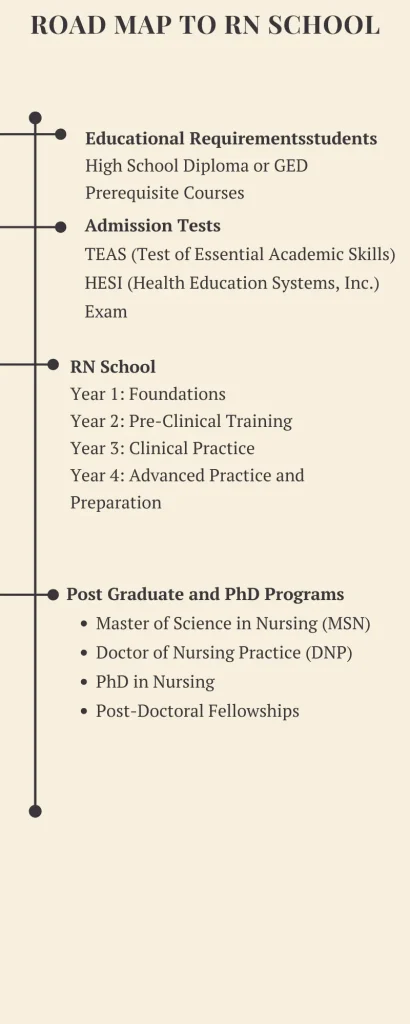How Long is RN School
How Long is RN School? The length of RN school varies depending on the program. An Associate Degree in Nursing (ADN) typically takes 2 years, while a Bachelor of Science in Nursing (BSN) usually takes 4 years. Accelerated programs and bridge options may alter how long RN school is for each individual.
What is RN School
RN school, or Registered Nurse school, is an educational program designed to prepare students for a career in nursing. These programs include coursework in anatomy, physiology, microbiology, chemistry, nutrition, and psychology. Clinical practice in hospitals and other healthcare settings is also a critical component, allowing students to apply theoretical knowledge in real-world scenarios.

RN school offers different pathways, including Associate Degree in Nursing (ADN), Bachelor of Science in Nursing (BSN), and diploma programs. Each pathway prepares students for the NCLEX-RN exam, which is required to become a licensed Registered Nurse. The choice of program depends on career goals, the time commitment, and educational background.
How Long is RN School
An undergraduate program for Registered Nursing (RN) typically leads to a Bachelor of Science in Nursing (BSN). The program can be broken down year-wise as follows:
Year 1: Foundations
- Core Courses: Students often start with foundational courses in biology, chemistry, anatomy, and physiology.
- General Education: This year usually includes general education courses such as English, psychology, and sociology, which are essential for developing a well-rounded knowledge base.
- Introduction to Nursing: Introductory nursing courses might begin, covering basics of nursing practice and patient care.
Year 2: Pre-Clinical Training
- Advanced Sciences: Students continue with more advanced courses in microbiology, pathophysiology, and pharmacology.
- Health Assessment: Courses in health assessment teach students how to evaluate patients’ physical conditions.
- Nursing Fundamentals: Fundamental nursing skills are further developed, including basic patient care techniques.
- Clinical Observation: Early clinical experiences may start, allowing students to observe and assist in healthcare settings.
Year 3: Clinical Practice
- Specialized Nursing Courses: Courses become more specialized, covering areas such as pediatric nursing, maternity and newborn care, mental health nursing, and adult health.
- Clinical Rotations: Extensive clinical rotations are a key part of the curriculum. Students work in various healthcare settings under supervision, applying their theoretical knowledge to real-world scenarios.
- Nursing Research: Introduction to nursing research methods and evidence-based practice.
Year 4: Advanced Practice and Preparation
- Leadership and Management: Courses in nursing leadership, management, and ethics prepare students for roles beyond bedside care.
- Community and Public Health: Focus on public health nursing and caring for populations.
- Capstone Project: Many programs require a capstone project or a comprehensive exam to demonstrate readiness for professional practice.
- Preparation for Licensure: Preparation for the NCLEX-RN (National Council Licensure Examination for Registered Nurses), including review courses and practice exams.

HOW TO ENTER RN SCHOOL
Educational Requirements for RN School:
High School Diploma or Equivalent:
Completion of high school or a GED.
Prerequisite Courses:
Biology, Chemistry, Anatomy and Physiology, Microbiology, Nutrition, and Psychology.
Often require a minimum grade (usually a C or higher).
College Entrance Exams:
SAT or ACT scores may be required for admission to BSN programs.
GPA Requirements:
Minimum GPA (often around 2.5-3.0) for prerequisite courses and overall academic performance.
Entry Tests for RN School:
TEAS (Test of Essential Academic Skills):
Commonly required for ADN and BSN programs.
Assesses reading, math, science, and English skills.
HESI (Health Education Systems, Inc.) Exam:
- Another common test assessing academic readiness for nursing programs.
- Covers similar areas as the TEAS.
Institution-Specific Exams:
- Some schools may have their own entrance exams or additional assessments.
Application Process for RN School:
Research and Choose Programs:
- Identify accredited ADN or BSN programs that meet your career goals.
Complete Prerequisites:
- Ensure all prerequisite courses are completed with the required grades.
Submit Application:
- Online or paper application through the school’s admissions office or application portal.
Provide Transcripts:
- Submit official high school and any college transcripts.
Test Scores:
- Provide scores for required entry tests (TEAS, HESI, SAT, ACT).
Letters of Recommendation:
- Obtain letters from teachers, employers, or healthcare professionals.
Personal Statement or Essay:
- Write a personal statement outlining your interest in nursing and career goals.
Interview:
- Some programs may require an interview as part of the selection process.
Financial Aids for RN School:
Federal Financial Aid:
- FAFSA (Free Application for Federal Student Aid):
- Apply to determine eligibility for federal grants, loans, and work-study programs.
State Financial Aid:
- State-specific grants and scholarships.
Institutional Aid:
- Scholarships and grants offered by the nursing school or college.
Private Scholarships:
- Scholarships from private organizations, foundations, and professional associations.
Employer Tuition Assistance:
- Some employers offer tuition reimbursement or assistance programs.
Student Loans:
- Federal and private loan options to cover tuition and expenses.
Work-Study Programs:
- Part-time employment opportunities to help cover educational costs.
Military and Veteran Benefits:
- Educational benefits for military personnel and veterans.
Post Graduate and PhD Programs for RN School
Master of Science in Nursing (MSN):
- Specializations: Nurse Practitioner (NP), Nurse Anesthetist (CRNA), Nurse Midwife (CNM), Nurse Educator, Nurse Administrator.
- Focus: Advanced clinical practice, leadership, or education roles in nursing.
- Duration: Typically 1.5 to 2 years full-time.
Doctor of Nursing Practice (DNP):
- Focus: Advanced clinical practice or healthcare leadership.
- Goals: Emphasizes evidence-based practice, leadership, and healthcare systems management.
- Duration: 3 to 4 years full-time post-MSN.
PhD in Nursing:
- Research Focus: Prepares nurses for roles in research, academia, and healthcare policy.
- Goals: Conduct original research, contribute to nursing science, and advance healthcare practice.
- Duration: Typically 3 to 5 years full-time post-MSN or BSN.
Post-Doctoral Fellowships:
- Purpose: Provides advanced training and mentorship in nursing research or specialized clinical areas.
- Duration: Varies, typically 1 to 3 years.
These programs build upon foundational nursing education and clinical experience, offering opportunities for specialization, leadership, research, and advanced practice roles within the nursing profession.
Top 10 RN Schools
Choosing the right nursing school can significantly impact your education and career. Here’s a list of ten highly regarded RN schools in the United States, known for their strong nursing programs, experienced faculty, and excellent clinical training opportunities:

1. Johns Hopkins University
- Location: Baltimore, MD
- Program Highlights: Known for its research facilities, diverse clinical experiences, and strong emphasis on public health.
2. University of Pennsylvania (Penn Nursing)
- Location: Philadelphia, PA
- Program Highlights: Offers a variety of specializations and dual-degree options, with a strong focus on interdisciplinary collaboration.
3. Duke University
- Location: Durham, NC
- Program Highlights: Emphasizes evidence-based practice and offers extensive research opportunities and global health experiences.
4. University of California, San Francisco (UCSF)
- Location: San Francisco, CA
- Program Highlights: Renowned for its focus on health disparities, community health, and advanced practice nursing.
5. University of Washington
- Location: Seattle, WA
- Program Highlights: Known for its comprehensive curriculum, innovative research, and leadership in public health nursing.
6. New York University (NYU)
- Location: New York, NY
- Program Highlights: Offers diverse clinical placements in a major metropolitan area and has strong global health initiatives.
7. Columbia University
- Location: New York, NY
- Program Highlights: Provides extensive research opportunities and a focus on healthcare policy and leadership.
8. University of Michigan, Ann Arbor
- Location: Ann Arbor, MI
- Program Highlights: Offers a wide range of nursing specializations and strong support for student research and innovation.
9. University of North Carolina at Chapel Hill (UNC)
- Location: Chapel Hill, NC
- Program Highlights: Known for its emphasis on rural health, community engagement, and health policy.
10. University of Pittsburgh
- Location: Pittsburgh, PA
- Program Highlights: Recognized for its robust clinical training, interdisciplinary research, and focus on patient-centered care.
Factors Affecting the Length of RN School
Type of Program:
ADN (Associate Degree in Nursing) typically takes 2 years.
BSN (Bachelor of Science in Nursing) programs generally take 4 years.
Accelerated Programs:
Offered for students with prior degrees, these programs can shorten the time to earn a BSN.
Bridge Programs:
Allow ADN graduates to bridge to a BSN, adding 1-2 years of study.
Clinical Requirements:
Hours spent in clinical rotations impact program length.
Prerequisite Courses:
Completion of required courses like anatomy, physiology, and microbiology may extend the timeline.
Part-time vs. Full-time Study:
Part-time study options can extend the duration of the program.
Program Structure:
Some schools offer modular or cohort-based programs that may affect the timeline.
Licensure Requirements:
Preparation for the NCLEX-RN exam is integrated into the curriculum, affecting program length.
Specialization or Dual Degrees:
Pursuing additional certifications or dual degrees may extend program length.
Clinical Competency Requirements:
Meeting specific clinical competency standards set by accrediting bodies may impact program duration.
These factors vary among institutions and program types, influencing the overall length of RN school and the educational experience provided.
Final Verdict
Choosing an RN school involves considering program length, accreditation, clinical opportunities, and financial aid. Top institutions like Johns Hopkins and University of Pennsylvania offer rigorous training. Factors like program type and clinical requirements affect the duration of RN education.
FAQs:
1.How long does it take to complete RN school?
Typically, an ADN (Associate Degree in Nursing) takes about 2 years, while a BSN (Bachelor of Science in Nursing) takes around 4 years.
2.What are the main differences between ADN and BSN programs?
ADN programs focus more on technical skills and clinical training, while BSN programs include a broader education in nursing theory, leadership, and research.
3.How can I finance my RN education?
Financial aid options include federal and state grants, scholarships, loans, and employer tuition assistance programs. Completing the FAFSA is often the first step.
4.What are the admission requirements for RN school?
Requirements typically include a high school diploma or equivalent, prerequisite courses like biology and chemistry, entrance exams (TEAS or HESI), and letters of recommendation.
5.What are the best RN schools in the United States?
Top RN schools often include Johns Hopkins University, University of Pennsylvania, and others known for their rigorous programs, faculty expertise, and clinical opportunities.
